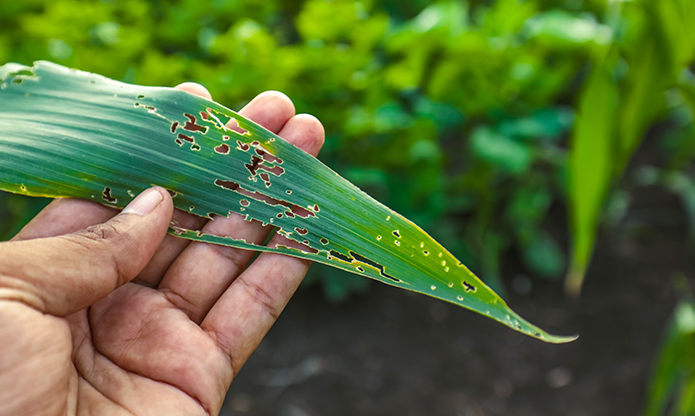Agriculture struggles to produce enough food to feed the world’s population while also struggling with diseases, weeds and pests that attack crops. Professor Paul Neve from the University of Copenhagen is receiving a grant of DKK 60 million from the Novo Nordisk Foundation to ensure healthier, more sustainable and more productive agriculture in the future.
Plant diseases, weeds and pests cause 30% of the world’s crops to be lost. This is a massive loss of food in a world that lacks food.
For decades, farmers have been heavily reliant on pesticides to counteract these diseases and pests. This is a huge problem for the environment, and the European Union therefore has a target of reducing pesticide use by 50% towards 2030.
Fulfilling the European Union’s ambitions requires new solutions in agriculture, and these are precisely what Paul Neve, Professor, Section for Crop Sciences, Department of Plant and Environmental Sciences, University of Copenhagen will develop with one of the Novo Nordisk Foundation’s ambitious Challenge Programme grants.
The grant of DKK 60 million over 6 years will provide Paul Neve and his team of researchers time and space to find solutions to what is considered a huge global challenge.
“The aim is to ensure that farmers become less dependent on pesticides. We will do this by developing better monitoring, prevention and resilience in agriculture to reduce the need for chemical intervention,” explains Paul Neve.
The research will be carried out in collaboration with the Department of Computer Science at the University of Copenhagen, Department of Agroecology of Aarhus University and Rothamsted Research, Harpenden, United Kingdom. Eleven PhD students will be affiliated with the research project.
Broad focus on crop health
In the research project, Paul Neve and colleagues will approach the challenge of agricultural pesticides from various angles.
Paul Neve explains that the idea is that agriculture needs to envision One Crop Health. This is a counterpart to One Health in health, in which disease control is more than just treating a disease with drugs but also about becoming much better at preventing the diseases from developing or detecting and treating them early.
Similarly, the idea behind One Crop Health is that initiatives in agriculture should not just focus on crops and pesticides but should take a holistic approach towards the challenges.
“Healthy people in a healthy environment are less likely to get ill and need treatment. The same applies to plants in a healthy environment and in healthy soil. They also require less pesticides. Our research project aims to determine how to create a healthy environment for plants and how to detect disease early and intervene early rather than just preventively controlling pests, weeds and diseases with pesticides,” says Paul Neve.
From real fields to digital fields
The researchers will examine the challenge within three focus areas.
First, they will establish networks of about 50 farms in both Denmark and the UK where they will monitor insect pests, beneficial insects, weeds, diseases and soil health. This part of the research will monitor fields with a range of surveys and sensors, including drones, to collect farmer field management data and environmental data. The aim is to combine all these data sets to understand the management as well as the climatic and environmental factors that drive the spatial and temporal population dynamics of pests and the biodiversity that regulates pest populations.
Second, the researchers will carry out large-scale experiments at the University of Copenhagen’s experimental fields, located near Taastrup, about 18 km west of Copenhagen. Part of the research there will seek to determine how rotating crops more often affects the development of plant diseases, pests and weeds. The rationale is that growing the same crop in a field year after year provides both diseases and pests the opportunity and time to establish themselves in a familiar host, whereas frequent rotation avoids creating a similar stable foundation for the pests. The researchers will also experiment with new cropping systems in which they will integrate new technologies to coordinate prevention, detection and control of pests, weeds and diseases and reduce the need for pesticides.
Finally, the researchers will use real-world data to develop digital twins of the interaction between soil, crops, fields, pests, weeds, pesticides and other factors. They can then manipulate the various factors and thereby find ways to reduce pesticide use.
“We will use real fields on live farms, experimental fields and digital fields to approach this challenge from all angles. We will also collaborate with researchers from the United Kingdom who are working on a similar project that aims to avoid pesticide use unless necessary,” explains Paul Neve.
Paul Neve says that the size of the Challenge Programme grant and the long time frame will enable the researchers to achieve these great ambitions.
Many research grants within agriculture are limited to 1 or 3 years, but this creates challenges since crops should be monitored over several years to balance out seasonal variation and investigate the effects of crop rotation.
“Long-term funding enables us to carry out the necessary experiments across a farm network, field scale experiments and digital twins to determine principles for reducing reliance on pesticides in future agricultural systems,” concludes Paul Neve.
Recipients of Challenge Programme grants in 2023
The Foundation has awarded seven grants within three Challenge Programme themes in 2023 for a total amount of DKK 378,7 million. The following are the projects, which run for 6 years.
RNA- and Oligonucleotide-based Therapeutics
- Nikos Hatzakis, University of Copenhagen, Center for Optimized Oligo Escape and Control of Disease (DKK 59,987,498)
- Jørgen Kjems, Aarhus University, Center for RNA Therapeutics towards Metabolic Disease (RNA-META) (DKK 59,999,374)
Prediction of Climate Change and Effect of Mitigating Solutions
- Christine Schøtt Hvidberg, University of Copenhagen, PRECISE – PREdiction of Ice Sheets on Earth (DKK 41,791,111)
- Guy Schurgers, University of Copenhagen, Global Wetland Center (DKK 59,890,858)
- Shfaqat Abbas Khan, Technical University of Denmark, Center for Ice-sheet and Sea-level Predictions (CISP) (DKK 37,020,114)
Future Agri-Food Systems
- Paul Neve, University of Copenhagen, One Crop Health for Next Generation Crop Protection (DKK 59,984,534)
- Stig Uggerhøj Andersen, Aarhus University, N2CROP – Legume Innovation for Future Agri-Food Systems” (DKK 59,997,659)
About the Challenge Programme
The Novo Nordisk Foundation established the Challenge Programme in 2014. Since then, the Foundation has awarded more than DKK 100 million every year for ambitious research focusing on global challenges.
The Challenge Programme targets research projects based on a thematic approach addressing some of the major societal challenges.
The Foundation awards individual grants of up to DKK 60 million.
Read more about the Challenge Programme here.









